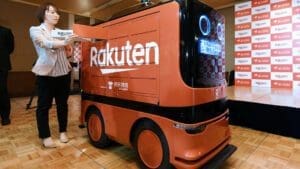 I spent the better of the last week in the sunny, warm confines of Southern Florida. It was a harsh dose of reality coming back to Boston and a snow storm. On our trip we saw iguanas, sea turtles, vultures, (wild) alligators, and a host of other animals. When it comes to animals, one of the best things I did with my family on vacation was to visit Panther Ridge, a non-profit conservation center in Loxahatchee, Florida that provides a home, haven, and hope for some of the world’s most majestic and endangered big cats. My kids are all obsessed with big cats, especially cheetahs and servals, so Panther Ridge was the ultimate destination for us on vacation. As much as we loved the cheetah (Charlie) and servals (Lexi and Duma), the most adorable animals we saw were the clouded leopard cubs. Our guide informed us that they are on the endangered species list due to palm oil deforestation. As we’ve written about here before, palm oil deforestation is taking its toll on the global supply chain, and major manufacturers are making the end of deforestation a priority. Let’s keep the clouded leopards in mind as we think about our future. And now on to this week’s logistics news.
I spent the better of the last week in the sunny, warm confines of Southern Florida. It was a harsh dose of reality coming back to Boston and a snow storm. On our trip we saw iguanas, sea turtles, vultures, (wild) alligators, and a host of other animals. When it comes to animals, one of the best things I did with my family on vacation was to visit Panther Ridge, a non-profit conservation center in Loxahatchee, Florida that provides a home, haven, and hope for some of the world’s most majestic and endangered big cats. My kids are all obsessed with big cats, especially cheetahs and servals, so Panther Ridge was the ultimate destination for us on vacation. As much as we loved the cheetah (Charlie) and servals (Lexi and Duma), the most adorable animals we saw were the clouded leopard cubs. Our guide informed us that they are on the endangered species list due to palm oil deforestation. As we’ve written about here before, palm oil deforestation is taking its toll on the global supply chain, and major manufacturers are making the end of deforestation a priority. Let’s keep the clouded leopards in mind as we think about our future. And now on to this week’s logistics news.
- Stamps.com severs relationship with USPS
- Delivery robots in the news:
- Colorado paves way to lower trucking age limits
- Sustainability in the news:
- Future of Georgia port expansion hinges on oxygen injectors to help fish
- Wegmans offers curbside pick-up at all home-town stores
 In a surprising move, Stamps.com has severed its relationship with the US Postal Service. The rationale behind this move is to keep more options open to its e-commerce customers. On an earnings call, Stamps.com CEO Ken McBride took time to outline the major reasons behind this announcement, such as the growth in e-commerce capabilities and performance of UPS, FedEx, and DHL. As e-commerce and the demands of faster shipping become more important, USPS’s lack of two-day guaranteed delivery today is becoming a bigger roadblock for many customers. McBride also singled out Amazon’s recent innovations, such as its soon-to-open air hub, as further reasons why the company needs to keep its options open.
In a surprising move, Stamps.com has severed its relationship with the US Postal Service. The rationale behind this move is to keep more options open to its e-commerce customers. On an earnings call, Stamps.com CEO Ken McBride took time to outline the major reasons behind this announcement, such as the growth in e-commerce capabilities and performance of UPS, FedEx, and DHL. As e-commerce and the demands of faster shipping become more important, USPS’s lack of two-day guaranteed delivery today is becoming a bigger roadblock for many customers. McBride also singled out Amazon’s recent innovations, such as its soon-to-open air hub, as further reasons why the company needs to keep its options open.
 Autonomous delivery bots are becoming a hot commodity these days. Chinese internet group JD.com said it will test driverless deliveries with Japanese peer Rakuten. JD is China’s second largest e-commerce company, and has said it will provide delivery robots, both drones and unmanned ground vehicles equipped with cameras and sensors for self-navigation to Rakuten to test last-mile deliveries in Japan. Rakuten is ramping up its own distribution infrastructure to counter Amazon and sees driverless deliveries as a way to cope with surging logistics costs.
Autonomous delivery bots are becoming a hot commodity these days. Chinese internet group JD.com said it will test driverless deliveries with Japanese peer Rakuten. JD is China’s second largest e-commerce company, and has said it will provide delivery robots, both drones and unmanned ground vehicles equipped with cameras and sensors for self-navigation to Rakuten to test last-mile deliveries in Japan. Rakuten is ramping up its own distribution infrastructure to counter Amazon and sees driverless deliveries as a way to cope with surging logistics costs.
 FedEx is also hopping into the delivery robot market. Earlier this week, the company said it will test a six-wheeled, autonomous robot called the SameDay Bot in Memphis, TN this summer. The company also plans to expand to more cities later this year. FedEx’s robot has a top speed of 10 mph and can carry about 100 pounds. The robot relies on sensors typically used on self-driving cars to identify and avoid pedestrians. The SameDay Bot is capable of climbing steps, but customers will need to be home to accept packages, as it won’t leave a package on a doorstep or open a front gate. The robot is being developed by DEKA, the Manchester, NH engineering company owned by Segway inventor Dean Kamen.
FedEx is also hopping into the delivery robot market. Earlier this week, the company said it will test a six-wheeled, autonomous robot called the SameDay Bot in Memphis, TN this summer. The company also plans to expand to more cities later this year. FedEx’s robot has a top speed of 10 mph and can carry about 100 pounds. The robot relies on sensors typically used on self-driving cars to identify and avoid pedestrians. The SameDay Bot is capable of climbing steps, but customers will need to be home to accept packages, as it won’t leave a package on a doorstep or open a front gate. The robot is being developed by DEKA, the Manchester, NH engineering company owned by Segway inventor Dean Kamen.
The driver shortage is an issue that has no imminent end. However, if the rules put forth by the state of Colorado have anything to do with it, relief could be on the way. Colorado Governor Jared Polis signed into law a bill that will open interstate trucking opportunities to people between the ages of 18 and 21 — as soon as federal law allows such activity. The legislation, which Polis signed last week, authorizes the state Department of Revenue to adopt rules that would allow 18-to-21-year-olds to participate in interstate commerce as long as they hold a commercial driver license; this law does not alter the state’s interstate trucking rules, which are governed by federal regulations. For in-state hauls, however, this could be a big step towards reducing the driver shortage.
Wendy’s has joined a group of rivals focused on improving sustainability within the food service packaging industry. The Ohio-based burger chain has joined the NextGen Consortium, a multiyear partnership of food service leaders including Starbucks, McDonald’s, Yum Brands, and Nestle. The group’s mission has been to combat single-use food packaging waste. Wendy’s has created its own approach to sustainability that it calls Squarely Sustainable, a nod to its signature square burgers. The approach focuses on using fewer unnecessary materials, using certified sustainable materials where possible, identifying customer-facing actions that can drive change and work with partners to find solutions to important problems. Wendy’s eliminated Styrofoam from its restaurants in 2012 and more recently reduced fiber and plastic in several packaging formats, such as fry cartons, straws and bags.
![]() Walmart has issued a new set of waste reduction commitments around plastic packaging for its private brand program. This initiative that is expected to impact more than 30,000 SKUs. According to Walmart, the move is designed to help get to the heart of the plastic waste problem by focusing on its private brand packaging, building on “existing efforts to reduce plastic waste in Walmart US and Sam’s Club operations,” and encouraging national brand suppliers to set similar packaging goals. Walmart announced it will work with its US private brand suppliers on the following commitments:
Walmart has issued a new set of waste reduction commitments around plastic packaging for its private brand program. This initiative that is expected to impact more than 30,000 SKUs. According to Walmart, the move is designed to help get to the heart of the plastic waste problem by focusing on its private brand packaging, building on “existing efforts to reduce plastic waste in Walmart US and Sam’s Club operations,” and encouraging national brand suppliers to set similar packaging goals. Walmart announced it will work with its US private brand suppliers on the following commitments:
- Target at least 20 percent post-consumer recycled content in private brand packaging by 2025
- Seek to achieve 100 percent recyclable, reusable, or industrially compostable packaging for its private brand packaging by 2025
- Label 100 percent of food and consumable private brand packaging with the How2Recycle® label by 2022
- Work with suppliers to eliminate the non-recyclable PVC packaging material in its general merchandise packaging by 2020
- Reduce private brand plastic packaging when possible, optimizing the use to meet the need
 The future of the Georgia Port expansion depends on the oxygen injectors to help fish breathe. The waterway is looking to expand as it deepens by 5 feet to make room for larger cargo ships. The Army Corps of Engineers has finished the first of two large oxygen-injection stations on the river. The machines are the agency’s $100 million solution to help fish breathe along a 27-mile stretch linking the Port of Savannah to the Atlantic Ocean. If the machines fail to produce the required oxygen for the fish, it could not only impact the wildlife within the waterway but jam up the whole $973 million harbor expansion project with dredging only halfway done. This is dues to a 2013 court settlement between the Army Corps, conservation groups, and state officials in neighboring South Carolina hinges on proof that the injectors work as promised.
The future of the Georgia Port expansion depends on the oxygen injectors to help fish breathe. The waterway is looking to expand as it deepens by 5 feet to make room for larger cargo ships. The Army Corps of Engineers has finished the first of two large oxygen-injection stations on the river. The machines are the agency’s $100 million solution to help fish breathe along a 27-mile stretch linking the Port of Savannah to the Atlantic Ocean. If the machines fail to produce the required oxygen for the fish, it could not only impact the wildlife within the waterway but jam up the whole $973 million harbor expansion project with dredging only halfway done. This is dues to a 2013 court settlement between the Army Corps, conservation groups, and state officials in neighboring South Carolina hinges on proof that the injectors work as promised.
 And finally, as online grocery services continue to heat up, curbside pick-up is becoming a big market. Wegmans has now decided that every food market in its hometown of Rochester, NY have the option of ordering their groceries online and picking them up curbside. The service, offered in partnership with San Francisco-based Instacart, enables customers to visit a dedicated website or log on to the Instacart app to shop for items, chose a pickup time, and pay for the order. Customers will receive an order confirmation with instructions and a phone number to call when they’re within 10 minutes of the store. On arrival, customers pull into the designated curbside pickup lane and a Wegmans associate will place their groceries in the car.
And finally, as online grocery services continue to heat up, curbside pick-up is becoming a big market. Wegmans has now decided that every food market in its hometown of Rochester, NY have the option of ordering their groceries online and picking them up curbside. The service, offered in partnership with San Francisco-based Instacart, enables customers to visit a dedicated website or log on to the Instacart app to shop for items, chose a pickup time, and pay for the order. Customers will receive an order confirmation with instructions and a phone number to call when they’re within 10 minutes of the store. On arrival, customers pull into the designated curbside pickup lane and a Wegmans associate will place their groceries in the car.
That’s all for this week. Enjoy the weekend and the song of the week, Def Leppard’s Animal.


















Good information shared. Transport Management System have module which is give accuracy in result of Transport and logistics system. Transportation is simply the recipient of collaboration that happens in other supply chain functions.